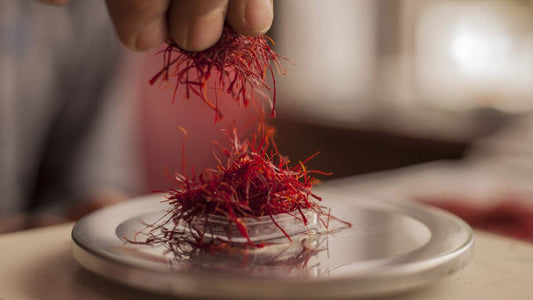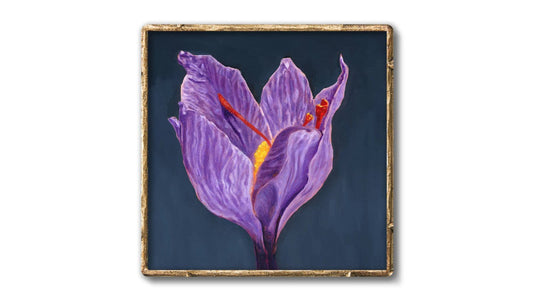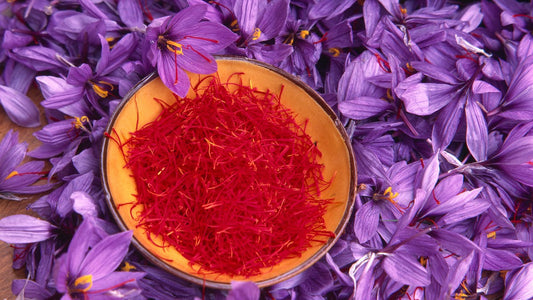
Discover the Remarkable Vision-Supporting Benefits of Saffron
Ara OhanianShare
In the vast and vibrant world of spices, saffron holds a place of distinction not only for its rich hue and exotic flavor but also for its surprising health benefits, particularly in supporting vision health. This golden spice, often referred to as "red gold" due to its deep red threads and high value, has been a treasure in traditional medicine for centuries. Recent studies have illuminated how saffron can be a pivotal element in maintaining and even enhancing visual health. Let's dive into the science behind saffron's benefits for eyesight, how to incorporate it into your diet, and why it might just be your eyes' new best friend.
What is Saffron?
Saffron is derived from the flower of Crocus sativus, commonly known as the saffron crocus. The vivid crimson stigmas and styles, known as threads, are collected and dried to be used mainly as a seasoning and coloring agent in food. Beyond its culinary uses, saffron has been cherished in traditional medicine across cultures for its health-promoting properties, including its antioxidant and neuroprotective effects.
Saffron and Vision: A Closer Look at the Research
Research has shown that saffron can have significant effects on eye health, particularly in the prevention and treatment of age-related macular degeneration (AMD), a leading cause of vision loss worldwide. A study published in the Journal of Translational Medicine suggests that saffron supplementation could help improve vision in people with early AMD. The research indicates that saffron appears to enhance retinal response to light, suggesting a protective effect against further damage.
How Saffron Supports Eye Health
The main mechanism by which saffron benefits the eyes is through its high concentration of natural antioxidants, including crocin, crocetin, and safranal. These compounds help protect the cells in the eyes from oxidative stress and damage, which are common causes of degenerative diseases like AMD and cataracts. Here’s how these components work:
-
Crocin and Crocetin: These are carotenoids that give saffron its vibrant color. They are powerful antioxidants that protect the retina—the part of the eye that acts like a camera sensor, converting what we see into neural signals for the brain. By neutralizing harmful free radicals, crocin and crocetin help maintain healthy blood flow to the retina, which is vital for proper visual function.
-
Safranal: This compound gives saffron its distinctive aroma and also acts as an antioxidant. Studies suggest that safranal can improve blood circulation within the eye, promoting nutrient and oxygen delivery while also protecting against photodamage from prolonged exposure to light.
Incorporating Saffron into Your Diet for Better Eye Health
Adding saffron to your diet is an enjoyable way to potentially enhance your vision. Here are some tips for incorporating saffron into your meals:
-
Saffron Tea: A soothing way to consume saffron is by steeping a few threads in hot water, perhaps with a bit of honey or lemon for flavor. This can be a calming nighttime beverage that offers the added benefit of vision support.
-
Cooking: Saffron is versatile in cooking and can be added to risottos, paellas, or other dishes that could benefit from its flavor and color. Since only a small amount is needed, it integrates easily without overwhelming other ingredients.
-
Supplements: For those who may not prefer cooking with saffron, supplements are available that provide a concentrated dose of the beneficial compounds found in saffron threads.
Potential Side Effects and Considerations
While saffron is generally safe for most people, it is potent, and high doses may lead to side effects such as dry mouth, anxiety, nausea, and headache. Pregnant women should avoid high doses of saffron, as it can act as a uterine stimulant. As with any supplement, it's wise to consult with a healthcare provider before starting any new treatment.
Conclusion
Saffron's potential to support vision makes it more than just a culinary delight. Its rich array of antioxidants can help protect the eyes and may improve symptoms in conditions like AMD. Whether you’re looking to spice up your cooking or find natural ways to support your eye health, saffron is a valuable addition to your diet.
For those interested in exploring the benefits of saffron further, whether for vision support or its other medicinal properties, embracing this ancient spice can add both flavor and health to your life.
FAQs About Saffron and Vision Support
How does saffron benefit vision?
Saffron contains high levels of natural antioxidants, such as crocin, crocetin, and safranal, which help protect the cells in the eyes from oxidative stress and damage. This protection is vital in preventing and treating conditions like age-related macular degeneration (AMD) and cataracts. Research suggests that saffron improves the eye’s response to light and helps maintain healthy blood flow to the retina.
Can saffron prevent or treat age-related macular degeneration (AMD)?
Several studies indicate that saffron supplementation might improve visual performance and protect against further damage in patients with early AMD. However, while saffron shows promise, it should not replace standard medical treatments but can be used as a complementary approach.
How can I add saffron to my diet?
Saffron can be consumed in several ways:
- As a tea: Steeping saffron threads in hot water creates a healthful drink.
- In cooking: Saffron can be added to dishes like risotto, paella, or soups for flavor and color.
- As a supplement: Saffron capsules are available for those seeking a more concentrated form of its beneficial compounds.
Are there any side effects of using saffron?
Saffron is generally safe when consumed in culinary amounts. However, high doses can cause side effects such as dry mouth, anxiety, nausea, and headache. Pregnant women should avoid high doses, as saffron can act as a uterine stimulant.
How much saffron should I take for vision support?
The amount of saffron recommended can vary based on the form (e.g., threads, powder, or supplement) and the specific health goals. For general health purposes, a small amount, such as a pinch in cooking or tea, is typically sufficient. For therapeutic purposes, such as vision support, studies often use doses around 20-30 mg per day. It's best to consult with a healthcare provider to determine the appropriate amount for your needs.
Can everyone use saffron for eye health?
While most people can safely incorporate small amounts of saffron into their diet, those with certain conditions or taking specific medications should consult a healthcare provider first. This is especially important for individuals with blood pressure issues or those on blood thinners, as saffron can affect blood pressure and blood clotting.
Is saffron effective on its own for improving eye health?
While saffron has beneficial properties, maintaining overall eye health should include a balanced diet rich in various nutrients, regular eye exams, and protecting the eyes from excessive light exposure. Saffron can be a part of a holistic approach to eye health but should not be relied upon exclusively.
Where can I buy high-quality saffron?
High-quality saffron is usually available in specialty spice stores, online platforms, and some health food stores. Look for saffron that is vividly colored and has a distinct aroma, which are indicators of its freshness and quality.




